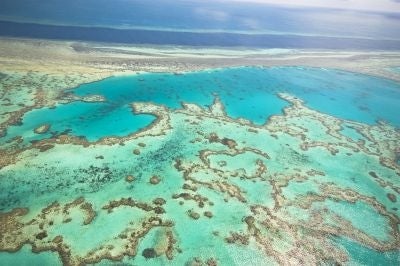Seaweed chokes Australia's Great Barrier Reef

Your support helps us to tell the story
From reproductive rights to climate change to Big Tech, The Independent is on the ground when the story is developing. Whether it's investigating the financials of Elon Musk's pro-Trump PAC or producing our latest documentary, 'The A Word', which shines a light on the American women fighting for reproductive rights, we know how important it is to parse out the facts from the messaging.
At such a critical moment in US history, we need reporters on the ground. Your donation allows us to keep sending journalists to speak to both sides of the story.
The Independent is trusted by Americans across the entire political spectrum. And unlike many other quality news outlets, we choose not to lock Americans out of our reporting and analysis with paywalls. We believe quality journalism should be available to everyone, paid for by those who can afford it.
Your support makes all the difference.Australian natural wonder the Great Barrier Reef is overgrown in places by seaweed in what could be a worrying indication of the health of the coral structure, scientists said on Wednesday.
Surveys of the World Heritage-listed reef, already at risk from global warming, found that more than 40 percent of areas closest to shore were dominated by green weed, Professor David Bellwood said.
"We knew there would be some weed there, we were just surprised how much," Bellwood, a marine biologist from James Cook University, told AFP.
"We are concerned about it because it does look like a lot of weed and in other places in the world, weed is an indication of decline."
Bellwood said the offshore reefs, those at least 20 kilometres (12.4 miles) from Australia's eastern coast, were largely untouched by the algae but that some of those closer to shore were choking with weed.
While the reason for the build-up of greenery was not known, Bellwood said he suspected it was because algae-eating fish have died out in those areas.
"The question is, does this mean the Barrier Reef is in real trouble? That the reef is rotting from the inside out? Or does it mean to say that that amount of weed is natural? And the answer is: it's hard to say," he said.
Bellwood, from the Centre of Excellence for Coral Reef Studies, said the best defence for the reef would be clean water and the existence of herbivorous fish which could graze on the weeds.
"The Great Barrier Reef is in the best condition of any reef in the world," he said.
"However, it is suffering. And it has suffered significant declines in coral cover in the last few years. The presence of that weed is just another little red light."
Scientists have already warned that the 345,000-square kilometre (133,000-square mile) attraction is in serious jeopardy as global warming and chemical runoff threaten to kill marine species and cause disease outbreaks.
Bellwood said the seaweed could be just the latest problem for the reef.
"It's just that when you combine run-off and fertiliser and pesticides and climate change and human interaction and coastal erosion and coastal development and fishing and overfishing... these things are all starting to accumulate," he said.
The reef is believed to have deteriorated significantly since European settlement in 1788, after enduring coral disease, toxic blue-green algae and infestation by pestilent species such as the crown-of-thorns starfish.
Join our commenting forum
Join thought-provoking conversations, follow other Independent readers and see their replies
Comments